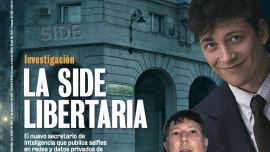Peace in the political arena has given way in recent weeks, if not months, as society’s concerns over the public health effects of the global coronavirus pandemic slide to the background, according to several surveys. This, of course, has revitalised the passionate, and often irrational, defence of one’s own political and ideological position, rendering “the issues” to a secondary place.
In this context, Argentina’s two major political coalitions, the governing Frente de Todos front and the opposing Juntos por el Cambio grouping are starting to seriously expose their own internal cracks. The problem within both coalitions is similar: hawks push to radicalise antagonistic positions with “the enemy” while doves argue it is time for consensus and cooperation, especially given Covid-19 and the depth of the economic crisis. At the centre of it all are President Alberto Fernández (supposedly under pressure from his vice-president, Cristina Fernández de Kirchner) and Buenos Aires City Mayor Horacio Rodríguez Larreta (pulled to the right by Mauricio Macri from his vacations in the French Riviera, despite a superficial effort by the former president to paint his trip to Europe as “work” for the FIFA Foundation. Pundits indicate that both coalitions are suffering from extreme tension, and the real question is how long will the acting leaders of each space last until either their will is dominated by the hawks or the groups balkanise. And while the mainstream journalistic narrative is appealing, in reality could be much simpler, and both Fernández and Rodríguez Larreta could be playing the game.
Those against?
The story goes something like this. Massive protests erupted this week across the country, with demonstrators rallying against the government. These weren’t organised by traditional political organisations but through social media, making them more spontaneous and without a specific leader or message. That is not to say that they were truly unsolicited though – there were clearly organised groups pulling the strings, and the involvement of political figures linked to Juntos por el Cambio, particularly Patricia Bullrich who is the president of the Macri’s PRO party. That being said, the protesters were more clearly identified with the 40 percent of the electorate that voted for Macri in last year’s elections, or against Mrs. Fernández de Kirchner to a larger degree. They were dubbed “anti-quarantine” protests by those sympathetic with the government, but the messaging was broad and generally against the current administration’s handling of the socio-economic situation, and of course its political ideology. Beyond the extended shelter-in-place measures and the deep economic recession, a key unifier of the protesters was a rejection of the government’s judicial reform bill, seen as a means to guarantee the impunity of the vice-president, her children Máximo and Florencia, and several high-ranking officials that are under investigation for corruption.
Rodríguez Larreta and his deputy, Diego Santilli, both opposed the mobilisation, describing it as unwise and siding with the national government, which raised questions about its potential to spread the virus. Both Santilli and Rodríguez Larreta gave interviews to RePerfilAr, Editorial Perfil’s newly released news show, calling on people not to participate and tacitly indicating they weren’t happy with Macri’s decision to go on a 40-day vacation to the Cote d’Azure just as the country implodes. Rodríguez Larreta made it clear that “there is no official leader of the opposition” and earlier this week, he left a Zoom videoconference with the leaders of the coalition, including Macri who chimed in from Zurich, early. All this is fodder for the media which is speculating about the mayor’s growing discontent with his party, which criticises him for collaborating on attempts to tackle the virus with Alberto and Buenos Aires Province Governor Axel Kicillof.
Those in control?
Within the ranks of the pan-Peronist coalition, the long shadow of Cristina Fernández de Kircner has always placed Alberto under suspicion. Many view him as a puppet, a placeholder for the queen. Several high-profile decisions of late appear to have been influenced, if not directly taken, by Cristina, as detailed in last week’s column.
The judicial reform made its way to the Senate this week, which is the vice-president’s realm. Despite having immunity given her political post, Cristina’s obsession throughout the campaign has been her legal situation, with a plethora of indictments and trials for corruption which, in several cases, expose her children, particularly Florencia who has no political protection, to potential jail time. She even left the country for medical reasons during Macri’s presidency, sparking rumours that her Cuban residence was meant to shield her from potential incarceration.
Cristina’s battle cry has been the concept of ‘Lawfare,’ claiming the Judiciary during the Macri years orchestrated a plan of political persecution against her and her family. Now in power, she’s continued to press home the argument, just as the Judiciary fixes its gaze on the Macri administration. Several cases investigating illegal espionage are under way, as is an inquiry into public service utility hikes, the adjudication of several contracts with the state (including the highway toll-booths run by the Macri family in association with the billionaire president of the Real Madrid football club, Florentino Pérez), and others. As quickly as Macri’s electoral fate was sealed, the Judiciary smelled the blood, putting itself at the disposal of the new rulers of the land, just like they did with Macri (and Cristina before him).
Back to the judicial reform bill. Alberto, who is a university law professor and supposedly an expert on the matter, has been forced to contradict what he had said publicly in the past. The reform seeks to expand the Supreme Court, a move seen as an attempt by Cristina to control the highest instance of institutional arbitration, and the federal justice system, meaning more judges that would dilute the power of Comodoro Py federal courthouse. A committee of experts to advise President Fernández was put together, and among them sits Dr. Carlos Beraldi, CFK’s personal lawyer. Furthermore, a last-second addition to the project by Cristina’s own lapdog, Senator Oscar Parrilli, appears to have been slipped in under the president’s nose. According to journalist Román Lejtman, the inclusion of an article allowing journalists and media organisations to be legally prosecuted for “pressuring” magistrates was added by Parrilli, at the behest of Cristina, without Alberto’s knowledge, meaning the President’s own project was being modified by CFK without his permission.
Those in power
According to this narrative, the president and the mayor are seeking to generate spaces of collaboration, building bridges across political spaces. But the actual major stakeholders in these groups, Macri and Cristina, want nothing more than to deepen the polarisation between the spaces.
Yet, it could be nothing more than illusion. Both Fernández and Rodríguez Larreta could be ‘playing the game’ with expert timing, leading the media and the public opinion to believe they are internally locked in a power struggle with the founders of their coalitions. They could then work to build through actions instead of words and, if the coronavirus pandemic leaves anything good in its wake, it leaves behind a good working relationship with the acting executives of the nation and its most powerful city. It would be a brilliant strategy, helping both coalitions to maintain their extended electoral bases (rather than focusing on the core group), and to lead their respective bureaucracies in the only way they can. That is, with Alberto appeasing CFK and her hardcore voters, and with Horacio collaborating with Fernández and Kicillof in order to deal with the pandemic.
If anyone found out they were playing us, though, they would be angry, and the mask would quickly fall off, revealing the grotesque trick. But, as long as the media, and the general population, continue to play to the tune of “la grieta,” then there’s no way such a scheme will be revealed.





















Comments